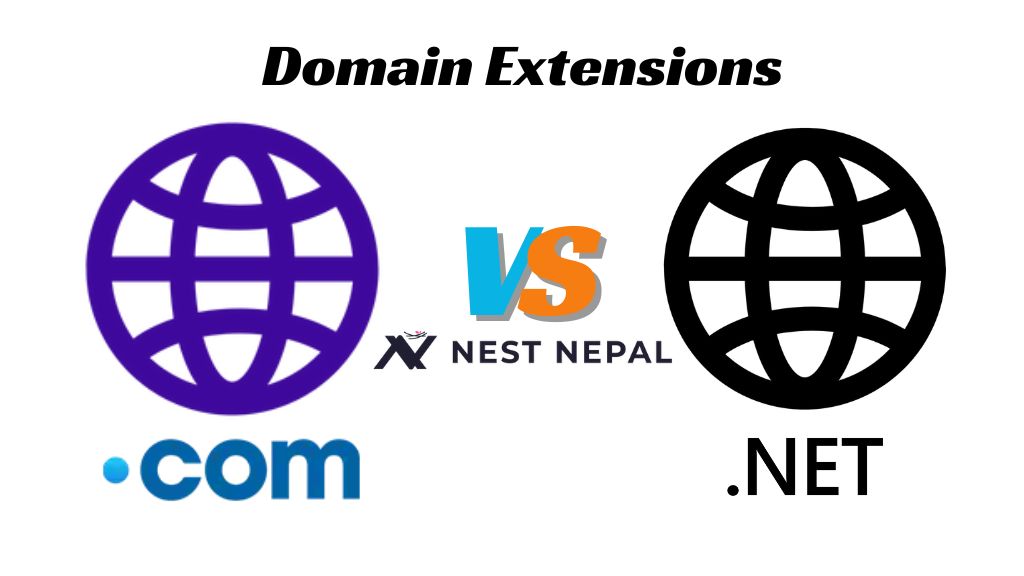When it comes to choosing a domain name for your website, the domain extension you select is as crucial as the name itself. The ‘.com’ and ‘.net’ extensions are among the most popular and widely recognized on the internet, but they serve different purposes and convey different implications for your website. In this detailed comparison, we will explore various aspects to help you make an informed decision between .com and .net for your online venture.
.com vs .net History and Background
.com: Originating from “commercial,” .com was one of the first generic top-level domains (gTLDs) created in 1985. Initially intended for commercial entities, it has since become synonymous with the internet itself, representing a wide range of businesses, organizations, and individuals worldwide.
.net: Short for “network,” .net was also introduced in 1985, alongside .com, with a specific focus on entities involved in networking technologies and infrastructure. While initially catering to network service providers, its usage has evolved to encompass a broader spectrum of purposes.
.com vs .net Domain Availability and Registration
.com: Due to its widespread popularity, finding an available .com domain that aligns with your desired name or brand can be challenging. However, various domain registrars offer .com domains, and the registration process is relatively straightforward.
.net: While .net domains are generally less saturated than .com, they are still widely used, particularly by businesses involved in networking, technology, and internet-related services. Registering a .net domain follows a similar process to that of .com, with numerous registrars offering this extension.
.com vs .net Purpose and Intended Use
.com: Traditionally associated with commercial entities, .com domains are commonly used by businesses of all sizes, e-commerce platforms, blogs, personal websites, and more. Its versatility makes it a preferred choice for establishing a professional online presence.
.net: Initially intended for network-related purposes, .net domains are often chosen by businesses involved in networking, internet infrastructure, technology services, and online communities. It is also suitable for businesses seeking a global network presence.
Also Read: A Comprehensive Guide of .xyz Domain
.com vs .net Branding and Perception
.com: With its longstanding history and widespread usage, .com domains convey a sense of credibility, reliability, and professionalism. They are often perceived as the default choice for businesses and organizations seeking to establish a strong online brand presence.
.net: While .net domains may not carry the same level of recognition as .com, they are still regarded as reputable and trustworthy, particularly within the technology and networking sectors. However, some users may associate .net domains with non-commercial or technical entities.
.com vs .net Search Engine Optimization (SEO)
.com: From an SEO standpoint, .com domains are generally favored by search engines due to their prevalence and perceived authority. They are more likely to rank higher in search results, providing better visibility and organic traffic potential.
.net: While .net domains can still perform well in search engine rankings, they may face slightly more competition than .com domains. However, with proper optimization strategies and quality content, .net websites can achieve favorable search engine visibility.
.com vs .net Domain Name Value
.com: The value of .com domains is often influenced by factors such as domain length, keyword relevance, brand recognition, and market demand. Premium .com domains with short, memorable names or popular keywords can command significant resale prices.
.net: Similarly, the value of .net domains depends on factors like domain quality, relevance to the industry, and market demand. While .net domains may not reach the same resale value as premium .com domains, they can still hold considerable worth for businesses and investors.
.com vs .net Security and Trustworthiness
.com: Domain registrars and hosting providers typically offer robust security features for .com domains, including SSL certificates, domain locking, and DNSSEC protocols. This helps enhance the security and trustworthiness of websites using .com domains.
opt.net: Similar to .com domains, .net domains benefit from security measures provided by registrars and hosting providers. By implementing SSL encryption, DNS security, and other protective measures, .net websites can maintain a secure online environment for users.
.com vs .net Renewal and Maintenance
.com: Renewing a .com domain involves paying a yearly registration fee to the domain registrar or hosting provider. Additionally, regular maintenance, such as updating DNS records and monitoring domain expiration dates, is essential to prevent domain loss.
.net: The renewal process for .net domains follows the same principles as .com, requiring annual payments to maintain ownership. Proactive maintenance and timely renewal are vital to ensure uninterrupted access to .net domains and associated services.
.com vs .net Pricing and Cost Comparison
.com: The cost of .com domains can vary depending on factors such as domain registrar, registration duration, and additional services bundled with the domain. While .com domains are generally more expensive than some other extensions, they offer unparalleled brand recognition and credibility.
.net: .net domains are often priced slightly lower than .com domains, making them a more cost-effective option for businesses and individuals on a budget. However, the difference in pricing may not be significant enough to outweigh the benefits of choosing a .com domain for branding purposes.
.com vs .net Legal Considerations
.com: As one of the oldest and most widely used domain extensions, .com domains are subject to various legal regulations and disputes, particularly regarding trademark infringement, cybersquatting, and domain name disputes. It is essential for domain owners to familiarize themselves with relevant laws and regulations to avoid legal complications.
.net: While .net domains are also subject to legal regulations similar to .com, they may encounter fewer trademark disputes and cybersquatting issues due to their narrower focus and lower market saturation. However, domain owners should still exercise caution and adhere to intellectual property laws to protect their online assets.
Conclusion
In conclusion, the choice between .com and .net domains ultimately depends on your specific needs, branding goals, and industry niche. While .com domains offer unparalleled recognition and credibility, .net domains are a viable alternative for businesses in the technology and networking sectors. By carefully considering factors such as availability, branding, SEO impact, and legal considerations, you can make an informed decision that aligns with your online objectives. Whether you choose a .com or .net domain, establishing a strong online presence is key to success in today’s digital landscape.
Frequently Asked Questions (FAQ)
Which is better: .com or .net?
If you prioritize widespread recognition and versatility, .com domains are preferable. They convey credibility and are suitable for various purposes, including commercial ventures and personal websites. On the other hand, if your focus is on networking or technology-related services, .net domains are a better fit. They are associated with technical expertise and can be easier to find available options. Ultimately, your choice should align with your branding, target audience, and specific objectives.
What is the main difference between .com and .net domains?
The primary distinction between .com and .net domains lies in their intended use and perception. .com domains are widely recognized as commercial entities, suitable for businesses, e-commerce sites, and personal ventures. On the other hand, .net domains are traditionally associated with networking, technology, and internet infrastructure services.
Which domain extension is better for SEO, .com or .net?
Both .com and .net domains can perform well in terms of search engine optimization (SEO). However, .com domains often have a slight advantage due to their widespread recognition and perceived authority. They are more likely to rank higher in search results, providing better visibility and organic traffic potential.
Are .com domains more expensive than .net domains?
In general, .com domains tend to be slightly more expensive than .net domains. This is primarily due to the widespread popularity and demand for .com extensions. However, the price difference may vary depending on the domain registrar and any additional services bundled with the domain.
Can I use a .net domain for my business website instead of a .com domain?
Yes, you can certainly use a .net domain for your business website. .net domains are suitable for businesses involved in networking, technology services, and online communities. While .com domains offer broader versatility and recognition, .net domains can still convey professionalism and credibility within specific industries.
Learn more: Buy your Domain Name Now with Nest Nepal









